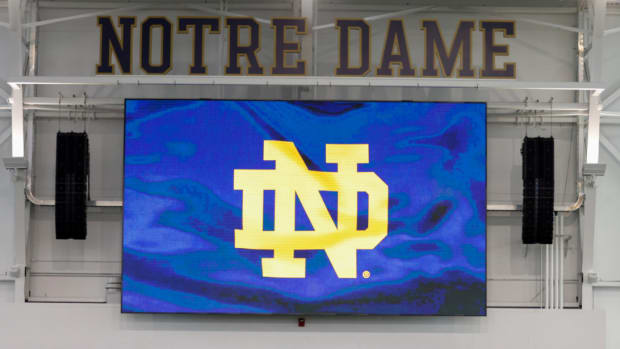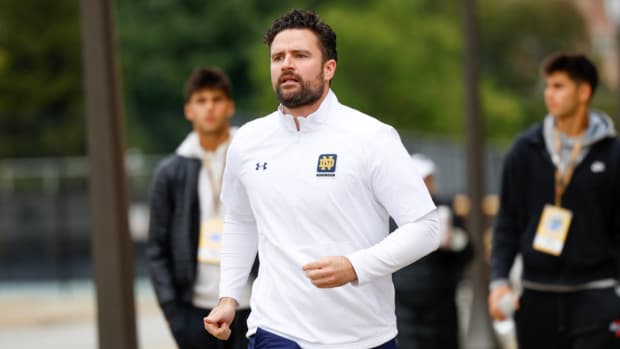Potential Schedule Changes a ‘Top Priority’ in CFP Expansion Efforts
DALLAS — For decades now, college football’s biggest rivalry games have kicked off on what has been coined Rivalry Week. For many, the Thanksgiving holiday weekend has been built around such matchups.
A side of turkey with the Egg Bowl. A dollop of cranberry sauce to go alongside The Game. Mashed potatoes and FSU-Florida.
In the new world of college football, maybe that’s in for a change.
The calendar took center stage on Thursday as leaders began exploring details of an expansion to the College Football Playoff, and that includes the possibility of moving the entire schedule up a week. The CFP’s management committee, made up of 10 FBS commissioners and Notre Dame athletic director Jack Swarbrick, met for roughly four hours—their first gathering since the CFP’s executive board voted to adopt a 12-team expansion model. They tasked commissioners with the duty of compromising on details and encouraged them to figure a way to expand the playoff as early as 2024.
Commissioners emerged from their meeting room with a common theme: It’s doable, but difficult.
“There are several more steps,” said Mountain West commissioner Craig Thompson. “A lot of moving parts and a lot of pieces.”
Said the SEC’s Greg Sankey on expanding early: “The opportunity is there.”
CFP executive director Bill Hancock described the calendar as “the top priority.”
“Everything falls out and feeds from the calendar,” he said. “When are we going to play these games?”
Among the litany of issues—explored by SI in earlier this week—the calendar and scheduling of games is the most complicated and needs to be tackled before the rest. While officials remain mum on specifics, several options are on the table, including a shift in the regular-season schedule.
In this concept, the official start of the season (Week 1) would move up to Week 0, thus shifting up the calendar by a week and expanding a tight December window in which to play the 11 playoff games. In this scenario, Rivalry Week would move into the third week of November and conference title games would kick off on Thanksgiving Week.
It’s just one concept being considered.
“We had a long conversation about the calendar,” Hancock acknowledged on Thursday. “No resolutions. But [commissioners] raised the matters that are going to have to be considered.”
That as well includes the academic calendar, graduation and, most notably, the NFL.
Dellenger: Six Issues That Need Fixing for a 12-Team CFB Playoff
To avoid competing against NFL regular-season games—the league plays some Saturday games starting in mid-December—first-round college playoff games could find their way on a Thursday night. The NFL adopted its own playoff expansion two years ago, further complicating matters. For example, the league has scheduled at least one wild-card game on a Monday night in mid-January, a date that might normally be reserved for the college title game in an expanded field.
“We looked at everything today—2024, 2025, 2026,” said ACC commissioner Jim Phillips. “I’m optimistic.”
Phillips says the first step rests with Hancock and the CFP staff. They must determine if Atlanta and Miami can still host the championship games in 2024 and ’25, respectively, if the title bout is moved back a week. Hancock said the staff is in communication with both cities. They have not discussed moving sites.
“They’ve been great partners,” Hancock said of Atlanta. “They’re working on it. I’m optimistic. But there’s a lot of work to do.”
The sole focus for the group is on early expansion in 2024 or ’25, the final two years of the current 12-year contract with ESPN. In fact, decisions on a ’26 expansion and beyond “can wait,” Hancock said.
“There is a serious understanding that they want to do everything possible to make this happen in Years 11 and 12 (of the contract),” he says. “It’s roll up our sleeves and focus on 11 and 12.”
ESPN has exclusive rights to any expanded playoff in 2024 and 2025. While some commissioners have expressed a desire for multiple media partners to broadcast the playoff, Hancock says there has been no discussion about having multiple networks for 2024-25 “because ESPN has the contract.”
“Everybody understands we need to talk to multiple networks,” Hancock said. “We have 11 games. We’d like to talk to multiple broadcasters about televising those. Whether multiple people televise them or not is to be determined. Might happen, might not. We all see an advantage in having multiple partners.”
The calendar remains the biggest looming issue.
Commissioners have established tentative dates for the four rounds, but nothing is concrete. The first round falls roughly two weeks after conference title games. The second round kicks off on the typical New Year’s Eve and New Year’s Day window. The semifinals would be played a week later followed by a championship game that, depending on the year, could kick off two or three weeks into January.
However, shifting the regular season up by a week would alleviate the cramped timeline. Semifinals could instead be played in the New Year’s Eve/New Year’s Day window and the championship game could remain at its current date. The extra time could as well be used as a week off for players.
There is no deadline to determine if the playoff can expand by 2024, but “things get harder as you wait more months,” Hancock said. “Deadlines in this world have been ‘It’ll be easier if we can do it by …”
In February, the same expansion model that was approved last week was rejected in an 8–3 vote. Commissioners of the Big Ten, ACC and Pac-12 voted against it, a move that now puts the CFP with a more difficult timeline to expand early.
Had that vote passed, “it would have been an enormous asset” to early expansion, Sankey says. “One of the deficits for not making the decision is we’re not farther down the road on details. Now the spirit is, we need to get after this. Attention is high. Prioritization is high.”
In his first commissioner meeting since taking over the Big 12, Brett Yormark expressed optimism in early expansion. “When an event is worth it, you do what you need to do to execute it.”
More College Football Coverage:




